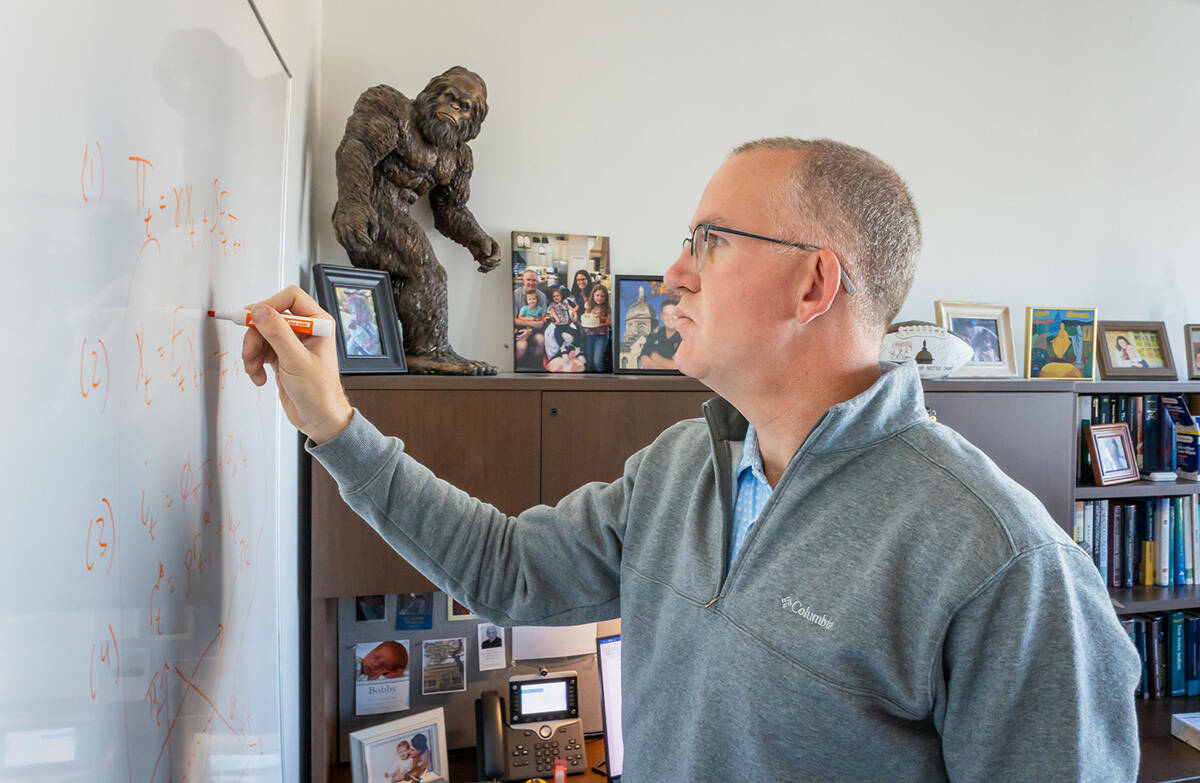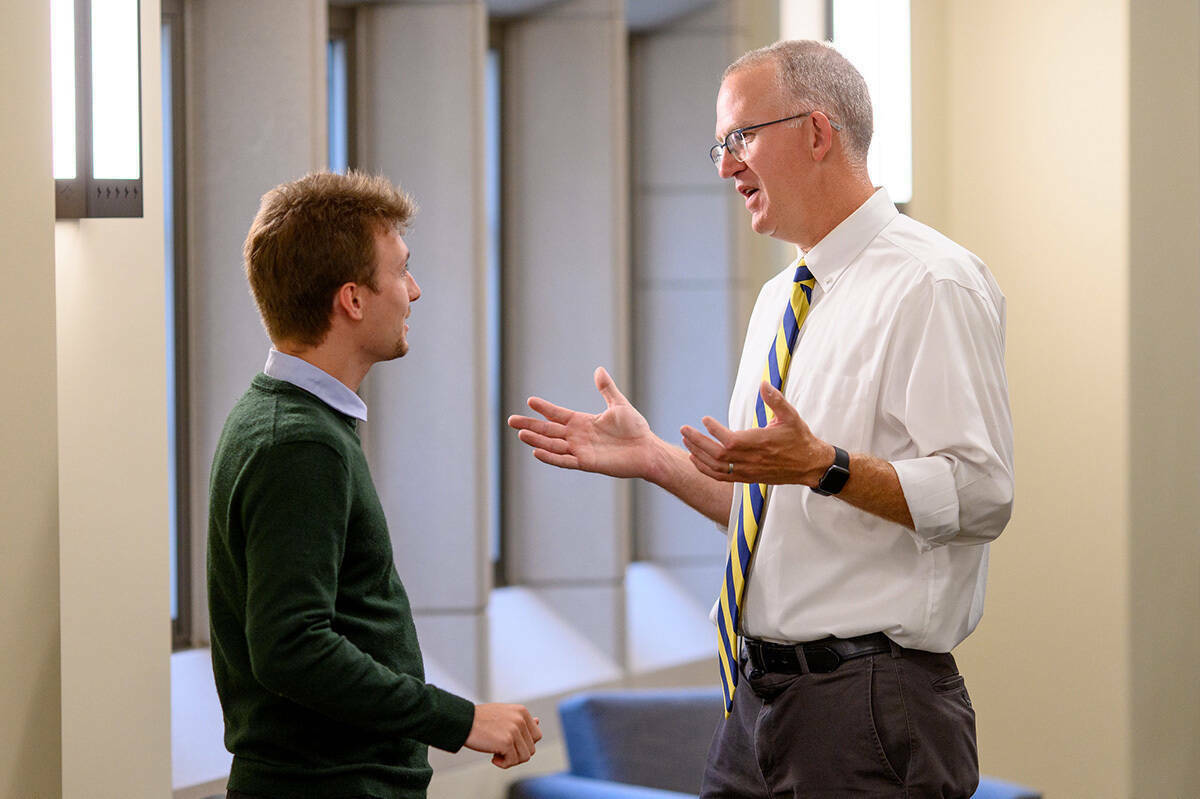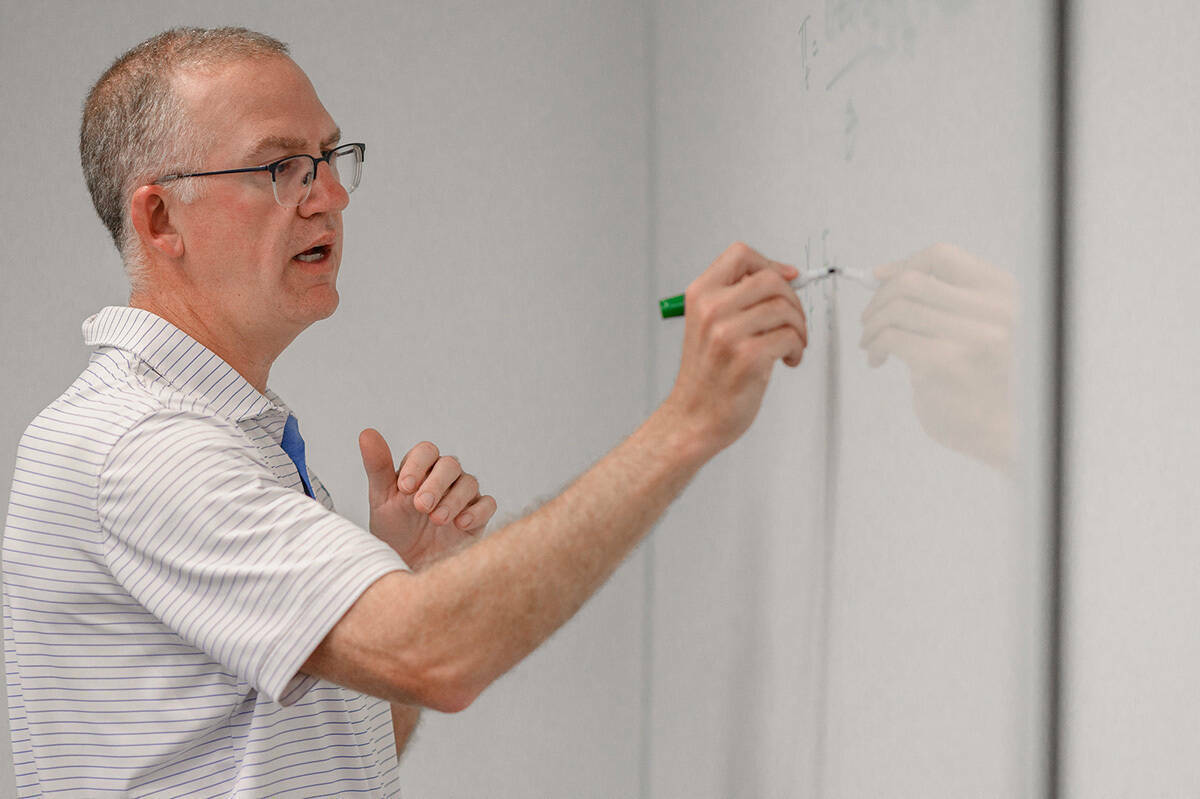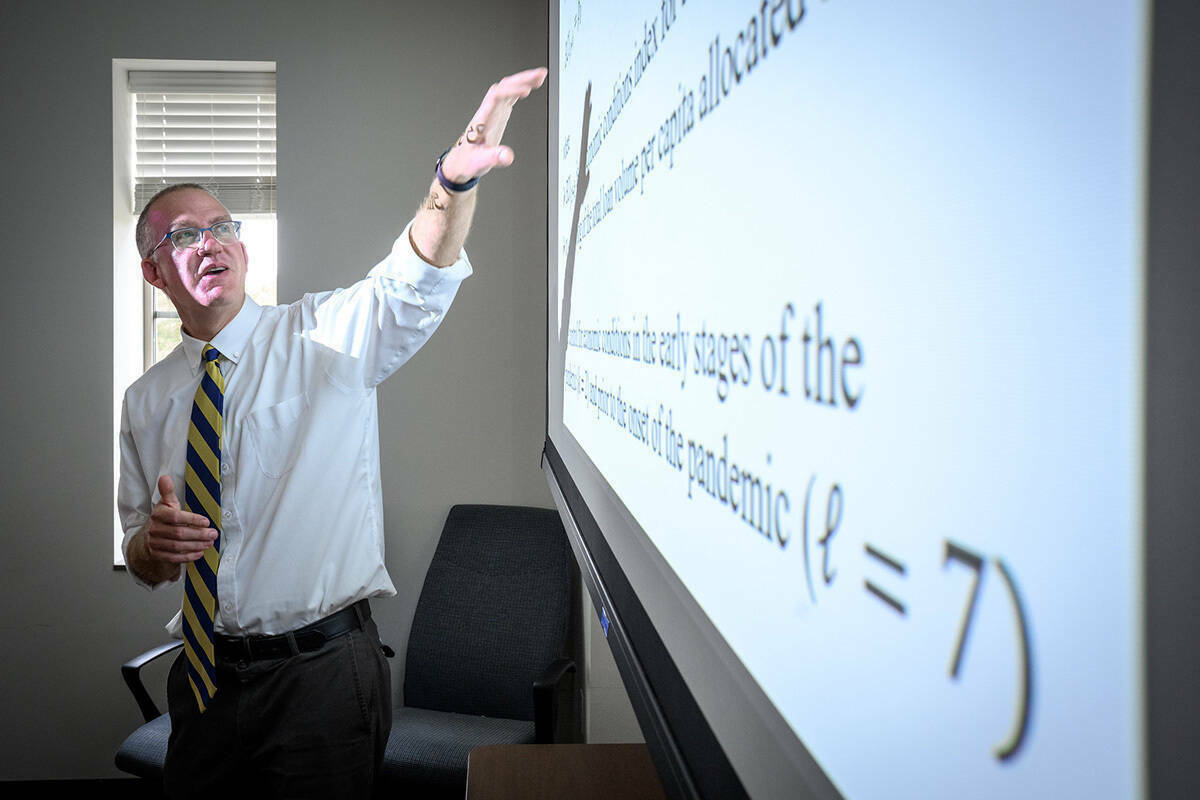
As students sit across from Eric Sims in his office, they get a one-on-one with the chair of the Department of Economics — and a glimpse of Bigfoot.
Three crucifixes, a painting of an unidentifiable pope, golf tournament trophies, and a well-worn couch fill Sims’ space, but it’s the large statue of the sasquatch that stands out as it looms toward students who come to the professor asking for advice.
“I let them know about my quirks,” said Sims, the Michael P. Grace II Collegiate Chair and professor of economics. “I'm authentic, I let them know what makes me tick, and I try to meet them on their level.”
Along with the conversational pieces are photos of Sims’ family — his wife, Jill, and children Molly, Caroline, and Catherine, who has an extremely rare neuromuscular disease and is wheelchair-bound. There's also a photo of son Bobby, who passed away in infancy of seemingly the same illness.
At the beginning of every course he teaches, Sims introduces himself by letting his students know about his enthusiasm for macroeconomics, his love for his family, and the challenges he and his wife have faced with their childrens’ health.
"If I can teach them something about dealing with adversity, figuring out what makes you tick, and following your passion, I view that as a win."
During his nearly 15 years at the University of Notre Dame, he has found being vulnerable with students is key to connecting with them.
“One of our roles and our responsibilities as faculty members is to help students discern their own life path,” he said. “If I can teach them something about dealing with adversity, figuring out what makes you tick, and following your passion, I view that as a win. And I think that by being open and vulnerable with them, it encourages them and gives them an opportunity to potentially be open and vulnerable with me.”
That skill of combining economics with empathy has also been recognized by his students and colleagues, and it ultimately led to Sims receiving the 2023 Sheedy Excellence in Teaching Award, the College of Arts & Letters’ highest teaching honor.
Created in 1970, the Sheedy award is named after Rev. Charles E. Sheedy, C.S.C., who served as dean of the College from 1952 to 1968. The award is given to a faculty member who demonstrates sustained excellence in research and instruction, motivates and enriches students with innovative and creative teaching methods, and has influenced teaching and learning.
Sims will be recognized at a ceremony and reception beginning at 3:30 p.m. on Wednesday, Dec. 6, in the new Raclin Murphy Museum of Art.
“I felt truly blessed to have been a student of Professor Sims at Notre Dame. He is dedicated to student growth, teaching, and fostering self confidence,” economics and political science major Kayle Liao ’23 wrote in a letter nominating Sims for the award. “When I’m asked by undergraduates on what economics electives to take at Notre Dame, I always recommend Professor Sims’ classes. I know he will continue to serve as an extraordinary mentor to many eager students like me and make a lasting impact on their lives.”
Finding the human element in economics

A lauded macroeconomist, Sims’ research focuses on business cycles and monetary and fiscal policies. His work is regularly published in notable journals and has been relied upon by the National Bureau of Economic Research and the Federal Reserve Bank of Cleveland. He’s co-authored an online textbook for use in intermediate macroeconomics courses, and ranks in the top 3 percent among all living economists in the Research Papers in Economics index, which quantifies how frequently an economist is cited by other scholars.
His lecture notes, however, might be among his most renowned material.
“Eric’s notes are so well-prepared and comprehensive that professors and students have adopted them at other universities, even in countries like Chile,” wrote Carlos Rondon Moreno, who earned his Ph.D. in 2019 and now works at the Central Bank of Chile, in a Sheedy nomination letter. “Since I graduated, I have met many colleagues who referenced Eric’s lecture notes as a crucial part of their learning process during their Ph.D. studies.”
While his papers often include detailed mathematical derivations and complex graphs, Sims strives to strike a balance in his class sessions between the analytical rigor and the human application of the subject.
“What we are really trying to do with macroeconomics is solve this really complicated puzzle,” he said. “And just when we think we've got a solution, something changes and we've got to think up another solution, and I think that's really exciting.”
That enthusiasm is contagious. In her nomination letter, Liao described Sims’ teaching approach as intellectually stimulating, in part because of how he incorporates current events into the day’s lesson.
“I was always excited to come to his class, knowing what I read about the Federal Reserve in the Wall Street Journal would be addressed in class,” she wrote. “He encourages everyone in his class to stay up to date with the economy and keep asking the bigger questions.”
Sims believes asking those bigger questions is key to constantly learning in life, and it’s something he continues to challenge himself to do.
“If you’re not learning, you’re not doing a good job,” he said. “Every time I’ve offered a course, I have come out with a better understanding of the material and I’ve come out of it with ideas of ways to better present the material on the blackboard.”
Breaking down the role of a professor

Before Sims came to Notre Dame in 2009, he graduated magna cum laude from Trinity University in San Antonio, then earned his Ph.D. at the University of Michigan.
As Sims was developing the skills that would help him thrive as a scholar, he was also considering the type of teacher he wanted to become. He admired professors who were organized and explained topics thoroughly, linearly, and constantly — traits he later sought to apply to his own pedagogy.
He also experienced firsthand the benefits of learning opportunities outside the classroom. As an undergraduate, Sims was a regular attendee of “the breakfast club” — small group meetings hosted by Trinity professor Rich Butler in a small conference room, devoted solely to working through economics problems with students.
Those sessions not only jumpstarted Sims’ addiction to black coffee, they also served as an inspiration for group sessions he now offers, where students are encouraged to learn from one another under his guidance.
“If you're struggling, maybe you can learn from a question your peers are asking. And we're going to work on problems together,” Sims said. “And, as part of that, I’ll get to know them better than I would in class.”
“We are simultaneously a major research university that engages in topics of debate in secular affairs, but we are also a university grounded in a religious faith tradition. And there is really no place in higher ed that combines all of those things into one.”
While working as a TA as a graduate student at Michigan, Sims discovered other core aspects about who he was as an educator — including his love for chalkboards, and the importance of not wearing a black shirt while teaching in front of one.
But, more importantly, he found his passion for teaching.
“I was so excited to be in a classroom,” Sims said. “It was my job to go into the discussion sections or tutorial sections and clean up the mess from lecture. So the students idolized me because I was like ‘OK, let me work out how to solve this problem, and cut out all the gibberish.’”
That quality for dissecting and translating complicated problems is something he carries on in his teaching today.
“(Sims) is exceptionally gifted in breaking complex things down to appear simple,” wrote Isabel Godl-Hanisch, a 2021 Ph.D. graduate who is now an assistant professor of economics at LMU Munich. “His teaching approach not only stimulates thinking during the class, but also stimulates research idea creation and long-lasting knowledge.”
As Sims went out on the job market, he knew he wanted to be at a university that produced groundbreaking research, had an emphasis on teaching, and provided grounding in his Catholic faith. He found one place that was distinctly positioned to satiate all of those desires.
“What excited me about Notre Dame was it was, and is, unique in the landscape of higher education, in the sense that we are simultaneously a major research university and an elite liberal arts college,” he said. “We are simultaneously a major research university that engages in topics of debate in secular affairs, but we are also a university grounded in a religious faith tradition. And there is really no place in higher ed that combines all of those things into one.”
‘Nothing great ever happens by playing it safe’

When a student reaches out to Sims to discuss a setback in class, he sees an opportunity to help them to grow. Because, like Sims, failure can be a motivating teacher.
Sims was a talented student as well, but was humbled when he failed two exams early in his academic career.
“I just got destroyed,” he said. “And I look back and those were two of the best things that ever happened to me, because they caused me to re-evaluate what I was doing.”
Those failures catalyzed Sims to do some soul-searching and find what his strengths were. He refocused, studied harder, and concentrated his efforts on what he ultimately wanted to do — ask questions that no one has asked before and tenaciously find the answers.
Through that experience, he recognized what he was capable of and now encourages students to open themselves up to that same vulnerable state.
“Take a class that you don't think you'll be good at, or that you've heard is hard. Ask a person out on a date if you think there's no way they would ever go out with you,” he said. “Expose yourself to the possibility of failure, because nothing great ever happens by playing it safe.”
Sims considers it a great privilege to help students grow from adversity because that’s when he feels he can give advice that offers the most value to their lives. And in the face of his childrens’ health adversities, his students came together to contribute value into his life.
“The way in which my students rallied around me in a moment of difficulty, in a moment of weakness, is one of the things that stands out the most to me. In that sense, I would say I think my students have done more for me than I have done for them.”
Soon after Catherine was born in 2013, she was hospitalized in Indianapolis for six months. Sims was teaching two undergraduate courses that fall and drove back and forth every week in order to be present for both his family and his students.
When he opened up to his students about what he was facing, a group came together to support him.
“They took me out to dinner while I was here by myself,” he said. “The way in which my students rallied around me in a moment of difficulty, in a moment of weakness, is one of the things that stands out the most to me. In that sense, I would say I think my students have done more for me than I have done for them.”
Sims believes his greatest skill as a teacher isn’t necessarily his pedagogy or lecture notes, but it’s his ability to empathize with students. And receiving the Sheedy Award has prompted him to reflect on the impact his students have had on him as a teacher, scholar, and person.
“At the end of the day, I'm filled mostly with a sense of gratitude that I've been able to work with the quality and caliber of students that we have at a place like Notre Dame,” he said. “Any success or any recognition that is being conferred upon me is in no small part due to the hundreds or thousands of students that I've had in class before — and that is my great privilege.”
Originally published by at al.nd.edu on November 30, 2023.